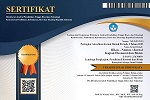THE IMPACT OF ISLAMIC FINANCIAL INCLUSION ON INDONESIAN HUMAN DEVELOPMENT
Abstract
This study seeks to examine the effect of Islamic financial inclusion on human development in Indonesia and to compare its effects between Western and Eastern Indonesia. The research included panel data from 33 provinces spanning the years 2018 to 2023, utilizing a quantitative methodology and a random effects regression model. The Islamic financial inclusion index is developed using the Principal Component Analysis (PCA) approach, including the dimensions of access, availability, and utilization of Islamic banking services. The study's findings indicate that Islamic financial inclusion positively and significantly impacts the Human Development Index (HDI) at both national and regional levels. The Western Indonesia region benefited most from IFI, but the Eastern region experienced a more uneven and lower impact. These results imply that more access to Islamic financial services can enhance people's standard of living, health, and education, all of which can impact their quality of life. The study advocates for the enhancement of Islamic financial infrastructure, the promotion of Islamic financial literacy, and the implementation of policies that address regional inequities.
Keywords
Full Text:
PDF (Bahasa Indonesia)References
Abdelghaffar, R. A., Emam, H. A., & Samak, N. A. (2023). Financial inclusion and human development: is there a nexus? Journal of Humanities and Applied Social Sciences, 5(3), 163–177. https://doi.org/10.1108/jhass-11-2021-0178
Bhuvaneskumar, A., Benedict, J., & Sankar, M. (2024). Does Financial Inclusion and Human Development Progress Sustainably? Evidence from Emerging Countries. Social Indicators Research, 171(1), 189–213. https://doi.org/10.1007/s11205-023-03240-4
BPS. (2024). Indeks Pembangunan Manusia (IPM) Tahun 2024. https://www.bps.go.id/id/pressrelease/2024/11/15/2296/indeks-pembangunan-manusia--ipm--indonesia-tahun-2024-mencapai-75-02--meningkat-0-63-poin-atau-0-85-persen-dibandingkan-tahun-sebelumnya-yang-sebesar-74-39-.html
Churchill, S. A., & Marisetty, V. B. (2020). Financial inclusion and poverty: a tale of forty-five thousand households. Applied Economics, 52(16), 1777–1788. https://doi.org/10.1080/00036846.2019.1678732
Hakim, L., Prawwatya, N., Huda, C., Fadila, D. F. S., & Rizaldi, M. (2024). The Role of Fintech Lending in Expanding Sharia Financial Inclusion and Human Development in Indonesia. Share: Jurnal Ekonomi Dan Keuangan Islam, 13(1), 299. https://doi.org/10.22373/share.v13i1.22548
Hidayat, A., Harunnurrasyid, Putra, A., Zunaidah, Ermadiani, Tjandrakirana, R., Yulianita, A., Atiyatna, D. P., & Shodrokova, X. (2025). Financial Institution Index, Banking Stability, and Human Development Index Nexus in Emerging Market Countries10. Ikonomicheski Izsledvania, 34(3), 22–45. https://www.researchgate.net/publication/390570393_Financial_Institution_Index_Banking_Stability_and_Human_Development_Index_Nexus_in_Emerging_Market_Countries
Hidayat, P., & Sari, R. L. (2022). Linkage between financial inclusion and Indonesian welfare: a recent evidence. Cogent Business and Management, 9(1). https://doi.org/10.1080/23311975.2022.2108299
Kamalu, K., & Ibrahim, W. H. B. W. (2023). Financial Inclusion and Human Development in OIC Member Countries: Evidence from Panel Quantile Regression Method. Iranian Economic Review, 27(2), 377–404. https://doi.org/10.22059/IER.2023.318255.1007100
Matekenya, W., Moyo, C., & Jeke, L. (2021). Financial inclusion and human development: Evidence from Sub-Saharan Africa. Development Southern Africa, 38(5), 683–700. https://doi.org/10.1080/0376835X.2020.1799760
Novreska, S., & Arundina, T. (2024). The Role of Islamic Financial Inclusion in Poverty, Income Inequality, and Human Development in Indonesia. Journal of Islamic Monetary Economics and Finance, 10(1), 135–154. https://doi.org/10.21098/jimf.v10i1.1973
Omodero, C. O. (2019). Government General Spending and Human Development: A Case Study of Nigeria. Academic Journal of Interdisciplinary Studies, 8(1), 51–59. https://doi.org/10.2478/ajis-2019-0005
Ouedraogo, H., & Thiombiano, N. (2025). Financial inclusion and human development in the West African Economic and Monetary Union (WAEMU): the role of institutional quality. Cogent Economics and Finance, 13(1). https://doi.org/10.1080/23322039.2025.2452888
Raichoudhury, A. (2016). Financial Inclusion & Human Development: A Cross Country Analysis. Asian Journal of Business Research, 6(1), 34–48. https://doi.org/10.14707/ajbr.160020
Rumbogo, T., McCann, P., Hermes, N., & Venhorst, V. (2021). Financial Inclusion and Inclusive Development in Indonesia. In Challenges of Governance: Development and Regional Integration in Southeast Asia and ASEAN (pp. 161–181). https://doi.org/10.1007/978-3-030-59054-3_8
Tissaoui, K., Hakimi, A., & Zaghdoudi, T. (2024). Can financial inclusion enhance human development? Evidence from low- and middle-income countries. Humanities and Social Sciences Communications, 11(1), 1–14. https://doi.org/10.1057/s41599-024-03048-8
UNDP. (2024). Human Development Report 2023/2024. https://hdr.undp.org/content/human-development-report-2023-24
Wahyudi, S. T., Nabella, R. S., Badriyah, N., Sari, K., & Radeetha, R. (2024). Forecasting Financial Inclusion and Its Impacts on Poverty and Inequality: A Comparative Study in ASEAN. Jurnal Ekonomi Kuantitatif Terapan, 17(1), 108. https://doi.org/10.24843/jekt.2024.v17.i01.p08
Wani, I. U., Alharthi, M., Khanday, I. N., Subhan, M., & Al-Faryan, M. A. S. (2024). Exploring the complementary interaction between financial inclusion and gender equality on economic growth: fresh evidence from developing countries. Cogent Economics and Finance, 12(1), 1–14. https://doi.org/10.1080/23322039.2024.2365585
Wooldridge, J. M. (2010). Econometric Analysis of Cross Section and Panel Data. Booksgooglecom, 58(2), 752. https://doi.org/10.1515/humr.2003.021
DOI: https://doi.org/10.37479/jkeb.v18i1.32416
Refbacks
- There are currently no refbacks.
Copyright (c) 2025 Oikos Nomos: Jurnal Kajian Ekonomi dan Bisnis


1.png)








